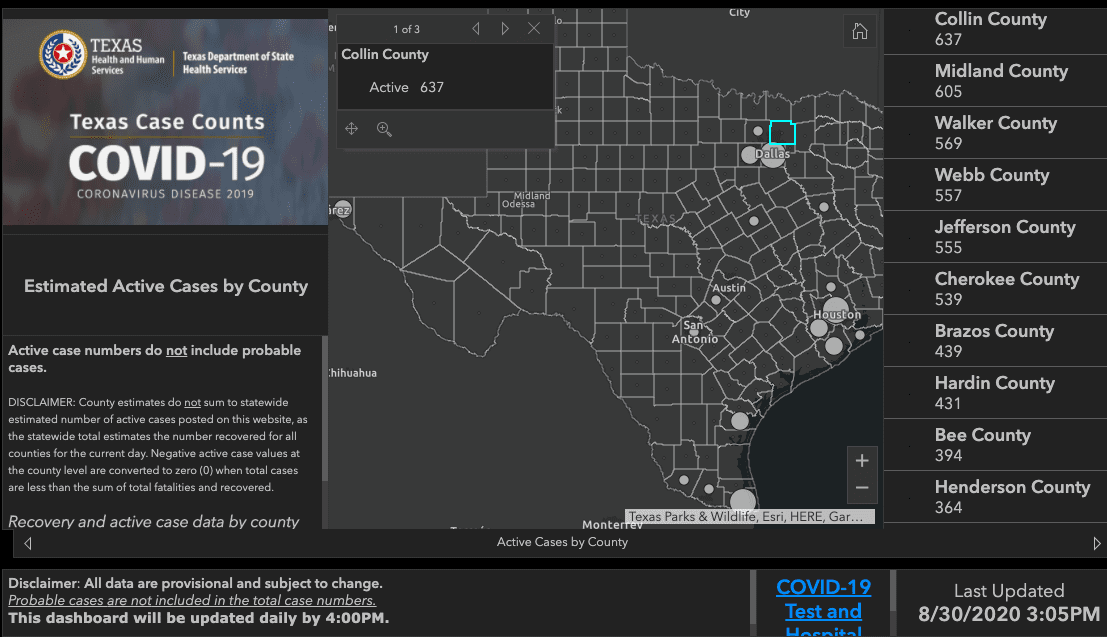Collin County’s top elected official says he still has no confidence in the accuracy of Chinese coronavirus data being used to set public policy in Texas after a “fix” by state health officials failed to clarify active case numbers.
“And the nonsense continues for another day,” County Judge Chris Hill posted to Facebook on Friday. “There seems to be no rhyme or reason, and no logic, to the numbers that keep coming out of DSHS.”
Hill has been raising concerns about the state’s data reporting since the Texas Department of State Health Services took over tracking and reporting Collin County’s coronavirus cases on June 1.
So have citizens suffering from months of government-ordered shutdowns, worrying about when they’ll be allowed to go back to work or send their kids back to school or visit loved ones in nursing facilities.
After Hill and the commissioners court called out the state’s bad data and pushed the agency to fix its “significantly overstated” active case counts, DSHS revised Collin County’s active COVID-19 case count on Wednesday—from 4,736 to just 81.
Active case counts matter because, for example, counties with “20 or less active cases” (regardless of the county’s size or population) can apply for an exemption from Texas Gov. Greg Abbott’s July 2 mask mandate—Abbott’s 22nd executive order since his first coronavirus disaster declaration in March.
Hill said earlier this month that the county was “100 percent certain” the data provided by DSHS and its Texas Health Trace tracking system was not accurate, in part because state officials were not removing all recoveries from the active case counts.
Collin and other counties also saw artificial spikes in their case counts after DSHS dumped a huge backlog of test results dating back as far as March into their reporting system.
The numbers were so off, commissioners added a disclaimer to the county’s website, warning residents that “because we have been made aware of inaccuracies” in DSHS reporting, the county “has no confidence in the data currently being provided to us.”
“On Wednesday, DSHS reported 81 active cases in Collin County, after informing us that they had fixed the issues and corrected the file,” Hill said Friday.
But he says the daily case numbers reported for the county since then still don’t add up:
“We continue to discuss the situation daily with DSHS officials, who continue to tell us they’re ‘working on it.’ But for now, I remain convinced that DSHS has no idea how many cases exist in Collin County.
“Do they really know how many COVID-19 cases there are in the rest of the state?”
“And yet these incorrect numbers continue to dictate our quality of life,” one county resident replied to Hill’s post.
“Their hospitalization numbers are every bit as bad,” said local grassroots leader Mike Openshaw, who has a background in virology and data analysis. “And these are the numbers that [Texas Gov. Greg] Abbott is setting policy based on.”
“We are watching and depending on these numbers to help make a decision on school after the first nine weeks,” wrote a local mom. “I still don’t know what is an accurate count in the community.”
“It was a mistake for Collin County to delegate this responsibility to the state,” Hill added. “I said it then, and I’m even more convinced of it now.”
Hill and Commissioner Cheryl Williams wanted to keep control of local case tracking within the county’s health department, as other large counties and metropolitan areas have done.
But Commissioners Susan Fletcher, Darrell Hale, and Duncan Webb said the county would not be able to hire enough staff to manage the caseload and should not spend the money on something the state was already doing.
Now Collin County has no way to unravel the mess created by the state, and it’s not clear if the state does either.
Other counties are dealing with the same bad data coming from DSHS. Some, like Travis County, are simply shifting their decision-making focus to other metrics that may or may not be any more reliable.
If Texans don’t have confidence in the data, they can’t have confidence in public policies based on that data. Citizens should find out if their local government officials are relying on faulty DSHS numbers to make decisions that impact their lives.
“The numbers aren’t right, they aren’t real, and they shouldn’t be used to determine public health policy,” said Hill.





